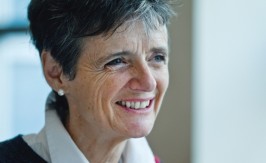 “Instead of fighting against the Nazis or against anti-Semitism, he was fighting for justice, liberty, life and dignity,” Louise von Dardel, the niece of Holocaust hero Raoul Wallenberg, says during her first ever visit to Canada after her uncle was made an honorary citizen of Montreal and Canada. Photograph by: Dave Sidaway, The Gazette
“Instead of fighting against the Nazis or against anti-Semitism, he was fighting for justice, liberty, life and dignity,” Louise von Dardel, the niece of Holocaust hero Raoul Wallenberg, says during her first ever visit to Canada after her uncle was made an honorary citizen of Montreal and Canada. Photograph by: Dave Sidaway, The GazetteMONTREAL — In 1944, Raoul Wallenberg rescued tens of thousands of Hungarian Jews from the Holocaust.
What inspiration can today’s generation take from the Swedish diplomat who stood up to Nazi oppression?
That’s a question Wallenberg’s niece, Louise von Dardel, often ponders.
“I’ve been thinking a lot about how we can learn from him today,” von Dardel, 62, said Tuesday in an interview during a one-day stopover in Montreal.
A former corporate consultant, von Dardel is a life coach who has spent 15 years promoting the memory of her uncle, who was taken into captivity by the Soviets at age 32 after saving tens of thousands of Hungarian Jews facing deportation to Nazi death camps.
Von Dardel visited Montreal on her way to Ottawa, where she was to help inaugurate an exhibition in the lobby of the Canadian War Museum marking the 100th anniversary of Wallenberg’s birth. The exhibition, titled To me there’s no other choice, will run until Jan. 6.
A Swedish businessman who studied architecture in the United States, Wallenberg was appointed diplomatic envoy to help save Jews in occupied Hungary after details about Nazi gas chambers became known.
From July to December 1944, he issued Swedish visas and passports to tens of thousands of Jews and provided food and shelter to many.
Summoned to Soviet military headquarters for questioning in January 1945, Wallenberg became a prisoner of a Soviet gulag. The Russian government claimed he died in prison in 1947, but many people believe he survived at least until the 1950s or 1960s.
He has been declared an honorary citizen of Canada, the U.S., Hungary and Israel. Last month, Montreal made Wallenberg an honorary citizen of the city.
Von Dardel, who was born five years after her uncle disappeared, said Wallenberg’s courage is a lesson to every generation.
“The first thing is instead of fighting against the Nazis or against anti-Semitism, he was fighting for justice, liberty, life and dignity,” she said.
“And as he was working for these basic values, he attracted lots of people who wanted to work with him. And (because of) his courage, people in contact with him lost their fear, too, and above all, the fear of death,” von Dardel added.
Wallenberg’s humanitarian achievements show it is possible to overcome apparently insurmountable odds when you stand up for what you believe is right, she said.
“We have hundreds of excuses” for not taking a stand — whether it is on environmental protection, civil rights, economic justice or war, von Dardel said.
She quoted the famous line, attributed to Edmund Burke: “The only thing necessary for the triumph of evil is for good men to do nothing.
“Today, if we don’t face the problem, it will be a catastrophe, financially, ecologically, militarily and for liberty,” she said.
Von Dardel called on Canada and other Western governments to pressure Russia to release the facts on Wallenberg’s incarceration and death.
She noted that time is running out to render justice to Wallenberg while some of those he helped are still alive.
“People don’t live forever,” she said.
Montrealer Bruce Kent, whose mother, Agnes, was among those saved by Wallenberg, echoed von Dardel’s appeal.
“It’s a tragedy of history that probably the greatest hero of the 20th century, a man who saved more Jews in the Holocaust than all countries combined, himself was then imprisoned and likely killed by the Soviets and that there’s no light shed on what his real fate was,” Kent said.
